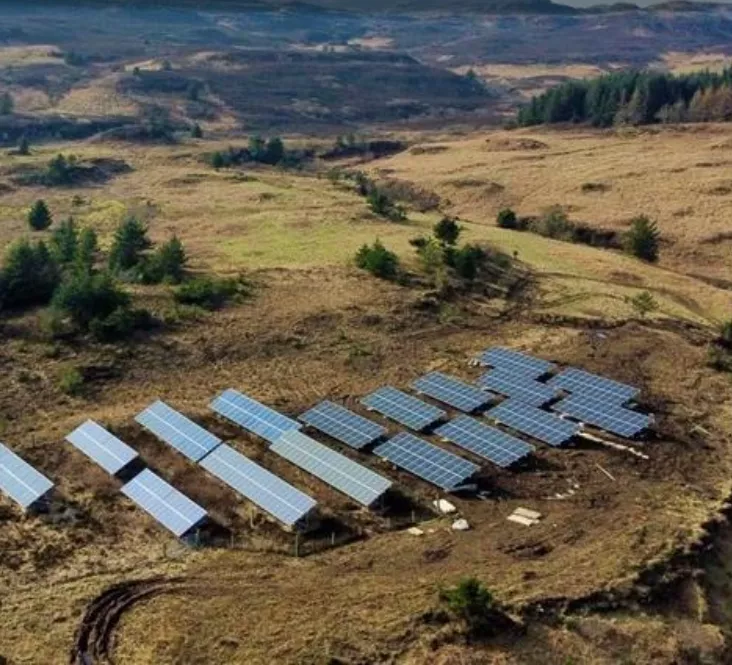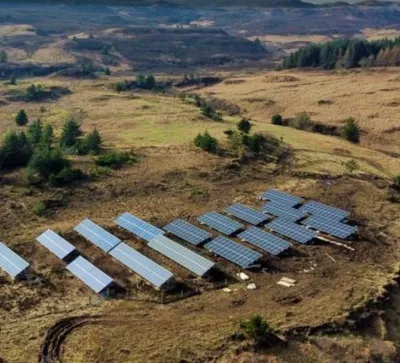Summary
Eigg is one of the Small Isles in the Scottish Inner Hebrides. The island, nine kilometres long and home to around 100 inhabitants, welcomes annually an average of 10 000 visitors and generates virtually all of its electricity through renewable energy.
The island is owned by the Isle of Eigg Heritage Trust (IEHT) which has managed it on behalf of the community since 1997. In 2008, Eigg achieved the milestone of becoming the first island in the world to generate all its electricity from sustainable sources.
The IEHT has responsibility for stewardship of the island, its buildings and natural heritage, and for supporting future development. The trust has a number of subsidiary companies, including Eigg Electric, which provides the island with electricity from renewables.
The latest transformational project was the expansion and extension of Eigg’s Community Hub ‘An Laimhrig’ (2022) which acts as the island’s economic, social and environmental hub, bringing together lifeline businesses such as the island’s shop and cafe, as well as other visitor-focused businesses and co-working spaces.
Results
Community ownership on the Isle of Eigg has led to transformative changes, with residents empowered to address local needs and develop a unique renewable energy system tailored to the island's requirements. This grassroots initiative has driven population growth and retained a diverse, vibrant community and has received multiple awards.
A reliable 24-hour electricity supply, powered by renewables, has enabled high-speed broadband access, promoting digital connectivity. Economic growth has flourished, fostering new businesses, including Scotland's first co-operative brewery. Eigg Electric and the Isle of Eigg Heritage Trust have created job opportunities for 18 residents, enhancing the local skills base.
These developments have attracted more visitors and encouraged diverse, sustainable enterprises, contributing to the island's economic vitality. The project aligns with the community's goal of transitioning to green energy and achieving carbon neutrality, with renewables supplying about 95% of Eigg's electricity. Residents have replaced traditional generators with cleaner, more sustainable energy solutions, benefitting both the environment and their quality of life.
Resources
Documents
Context
The Isle of Eigg, located 10 miles off Scotland's west coast, boasts a rich history, abundant wildlife and a vibrant community. In 1997, the IEHT achieved a significant milestone by becoming the second community buyout in Scotland. Comprising three members – the Isle of Eigg Residents Association (IERA), the Scottish Wildlife Trust and the Highland Council – the IEHT is directed and represented by the IERA, ensuring the voice of Eigg residents shapes its trajectory. Before the buyout in 1997, Eigg faced several challenges, including insecurity of tenure for residents and businesses, absence of mains electricity, limited infrastructure, scarce job opportunities and a declining population. The transformation since then has been remarkable. Eigg now boasts its renewable electricity grid, a 75% increase in population, a thriving and diverse economy, and revitalised services and facilities.
Objectives
To support the sustainable development of the island while addressing local needs and empowering the community, several objectives were established.
One of the primary goals was to enhance energy efficiency and independence. This was achieved in 2008 thanks to Eigg Electric (EEL), using hydro, wind and solar technologies, coupled with battery storage and a comprehensive distribution grid. Furthermore, EEL, in collaboration with IEHT and the community, is committed to achieving carbon neutrality by 2030. This ambitious target will be accomplished by decarbonising heating systems, leveraging Eigg's circular economy and actively engaging with the local community.
Activities,key actors, and timeline
In 1997, the Isle of Eigg underwent a significant transformation as it transitioned into community ownership. The following year, in 1998, a pivotal establishment, An Laimhrig, emerged, serving as a crucial social and economic hub for the island's residents. The year 2008 witnessed another remarkable milestone as Eigg Electric was switched on, following over four years of meticulous development. This innovative venture harnessed a combination of energy sources, including 110 kWp hydro, 24 kWp wind and 10 kWp solar photovoltaics (PV), to ensure a consistent and sustainable electricity supply. To manage electricity consumption effectively, a maximum usage limit of 5 kW was implemented for each household, while businesses were allocated 10 kW. Any surplus power generated was cleverly redirected to space heaters in community buildings, not only reducing heating costs but also providing warmth during the winter months. In subsequent years, the commitment to sustainable energy continued to grow. Additional solar PV systems were integrated into the network in both 2011 and 2013, collectively contributing 44 kWp and bringing the total solar PV capacity to over 50 kWp. By 2019, an upgrade featuring the MultiCluster Box and Battery Inverter System further enhanced the island's energy infrastructure. This modernisation facilitated more efficient energy management. Fast forward to 2022, an additional 118 kWp of solar PV capacity was integrated into the system, accompanied by the installation of new inverters and battery storage solutions. These enhancements bolstered the island's energy resilience. The same year marked 25 years of community ownership. To commemorate this achievement, an extensive refurbishment and expansion project was undertaken at An Laimhrig. Notably, this project incorporated cutting-edge solar and biomass technologies to provide heat and hot water, further advancing Eigg's commitment to sustainable living.
Success factors/lessons learnt
Eigg Electric has showcased the feasibility of large-scale off-grid applications, achieving resilient and sustainable economic development. Overcoming challenges such as maintaining specialised electrical engineering expertise and securing funding for expansion has been critical to its success. This model thrives on community empowerment and active involvement of local government. Eigg's ability to innovate is informed by lessons learned from similar remote and off-grid communities globally, fostering the development of novel off-grid projects and the exchange of best practices. Collaboration between island entities, namely IEHT and IERA, ensures that all community perspectives are considered, leading to decisions that benefit both the community and the island as a whole.
Contacts
Rebecca Long, Rebecca.long@isleofeigg.org

